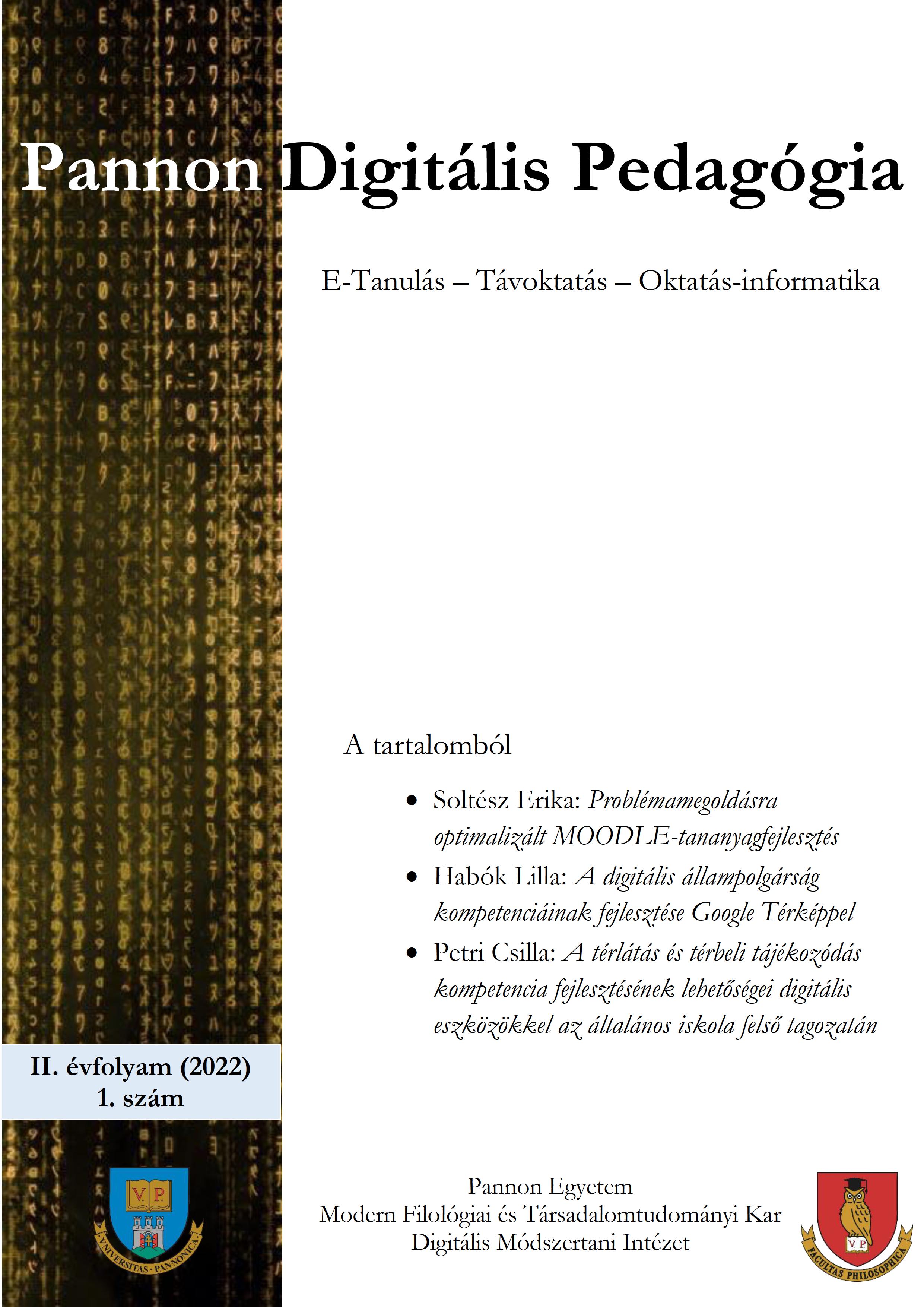Problémamegoldásra optimalizált MOODLE-tananyagfejlesztés
DOI:
https://doi.org/10.56665/PADIPE.2022.1.2Keywords:
instructional design, curriculum development, electronic curriculum, problem solvingAbstract
The importance of e-Learning materials has become increasingly important in recent decades. The traditional
learning environment in the classroom is not only complemented by online curricula, but is also taking part of the teaching-learning process to the online space. This can enable learning to become independent in space and time, thereby better adapting to individual student characteristics (OLLÉ ET AL., 2018). In the pandemic world of recent years, demands related to the effectiveness of online learning materials have intensified (WALIA, 2020). This means not only the desire for more effective learning, but also the development of 21st century employee competencies. Thus, the study of individual learning opportunities based on curricula optimized for these competencies has become an important area. In my research, out of 7 “core skills” (Laar et al., 2020), I examine the effectiveness of problem-optimized curricula. Of the problem categories, poorly structured problems are what define my research curriculum. Based on the curriculum design principles that focus on problem solving (e.g., JONASSEN, 1997; OLLÉ ET AL., 2015), eight experimental curriculum versions were developed and available to students participating in the experiment on a MOODLE interface installed on my own website. The course materials are organized around an accident during the concreting of a monolithic reinforced concrete slab, where the student has to enumerat, interpret and arrang the possible causes of the accident. After the manuscripts have been completed, the learning materials have been created in the H5P interactive presentation, where it is possible to include text, images, video and tests, and the student can navigate between the pages independently according to their individual needs. The MOODLE interface allows the experimental units to be included in a separate course, making it easy to assign students to individual learning materials, arrange input and final questionnaires, and access learning data. The curriculum variants were prepared on the basis of ten hypotheses, which were determined on the basis of research on the logical structure, visual and linguistic design and layout of the curriculum. The target group of students in the research is adult students participating in various construction trainings, as the curriculum content for poorly structured problems typically appears in the context of a specialized field.
References
GYARMATHY Éva (2021): Közös intelligencia, a közösség szellemi ereje = Szociálpedagógia, 18. sz. 29-46. p. http://real-j.mtak.hu/18376/7/szocped18_2021.pdf (Utolsó megtekintés: 2022. február 18.)
HÉJJA-NAGY Katalin (2015): Tanulási stratégiák és a tanulói aktivitást befolyásoló egyéni feltételek online környezetben. In: Lévai Dóra – Papp-Danka Adrienn (szerk.): Interaktív oktatásinformatika. Budapest, ELTE Eötvös Kiadó. 33-49. p.
JAMALUDIN, Azilawati – HUND, David: (2017): Problem-solving for STEM learning: navigating games as narrativized problem spaces for 21st century competencies = Research and Practice in Technology Enhanced Learning. 12. évf. 1.sz. DOI 10.1186/s41039-016-0038-0
JANURIKNÉ SOLTÉSZ Erika (2014): Építéstechnológia. Monolit szerkezetépítés. Zsaluzatok – Öntöttfalas. In: BISZTRAY Júlia, BOKOR Orsolya, BRASSNYÓ László [et al]: Építéstudományi tananyag BSc képzéshez Budapest, Szent István Egyetem Ybl Miklós Építéstudományi Kar. https://e-tudasbazis.ymmf.hu/ (Utolsó megtekintés: 2022. július 08.)
JONASSEN, David H. (1997): Instructional Design Models for Well-Structured and Ill-Structured Problem-Solving Learning Outcomes = Educational technology research and development, 45. évf. 1. sz. 65-94. p.
MOLNÁR Gyöngyvér (2016): Technológiaalapú tesztelés az oktatásban: a problémamegoldó képességfejlődésének értékelése. Akadémiai doktori értekezés tézisei. Kézirat http://real-d.mtak.hu/920/1/dc_968_14_tezisek.pdf (Utolsó megtekintés: 2022. február 18.)
OLLÉ János – KOCSIS Ágnes – MOLNÁR Előd – SABLIK Henrik – PÁPAI Anna – FARAGÓ Boglárka (2015): Oktatástervezés, digitális tartalomfejlesztés. Eger, Líceum Kiadó.
OLLÉ János – SOLTÉSZ Erika – KOVÁCS Cintia (2018): Online tananyag- és kritikai gondolkodásfejlesztés. In: BUDA András – KISS Endre (szerk.) Interdiszciplináris pedagógia és a taneszközök változó regiszterei: a X. Kiss Árpád Emlékkonferencia előadásainak szerkesztett változata. Debreceni Egyetem Bölcsészettudományi Kar, Nevelés- és Művelődéstudományi Intézet, 192-199. p.
PELÁNEK, Radek – JARUŠEK, Petr (2015): Student Modeling Based on Problem Solving Times = International Journal of Artificial Intelligence in Education, 25. évf. 4. sz. 493–519. p.
van Laar, Ester– Deursen, Alexander J.A.M. – Van Dijk, Jan A.G.M. – Haan, Jos (2020): Determinants of 21st-Century Skills and 21st-Century Digital Skills for Workers. A Systematic Literature Review = SAGE Open, 10. évf. 1.sz. 1-14. p. DOI 10.1177/2158244019900176
WALIA, Parminder (2020): 7 Tips to Follow to Create Effective eLearning Course Material https://elearningindustry.com/7-tips-follow-create-effective-elearning-course-material (Utolsó megtekintés: 2022. február 18.) 9
Downloads
Published
Versions
- 2023-01-17 (2)
- 2022-09-26 (1)

